Organizational Behavior Analysis Report: Tesco PLC Case Study
VerifiedAdded on 2023/01/05
|14
|4547
|43
Report
AI Summary
This report provides an in-depth analysis of organizational behavior within Tesco PLC. It begins by examining the influence of organizational culture, power dynamics, and political landscapes on individual and team behavior and performance. The report then delves into content and process theories of motivation, exploring their application within the company. A key component of the analysis involves differentiating between effective and ineffective teams, offering insights into team dynamics and management strategies. Furthermore, the report applies various concepts related to organizational behavior to real-world scenarios within Tesco, providing a comprehensive understanding of how these principles impact the organization's operations and success. The study also incorporates Hofstede's Cultural Dimensions Theory to understand the cultural context of the organization. The report concludes with recommendations for improving organizational effectiveness.
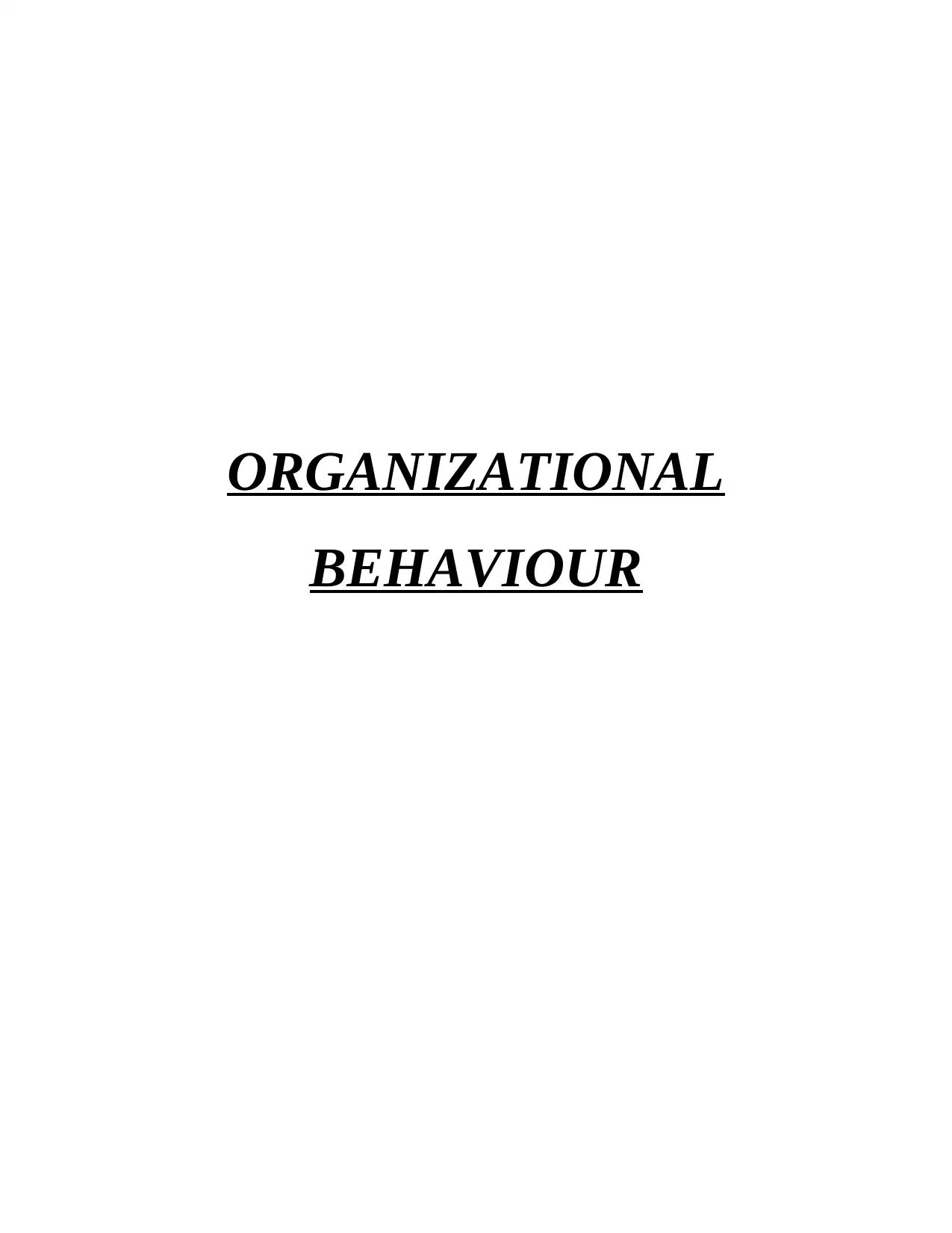
ORGANIZATIONAL
BEHAVIOUR
BEHAVIOUR
Paraphrase This Document
Need a fresh take? Get an instant paraphrase of this document with our AI Paraphraser
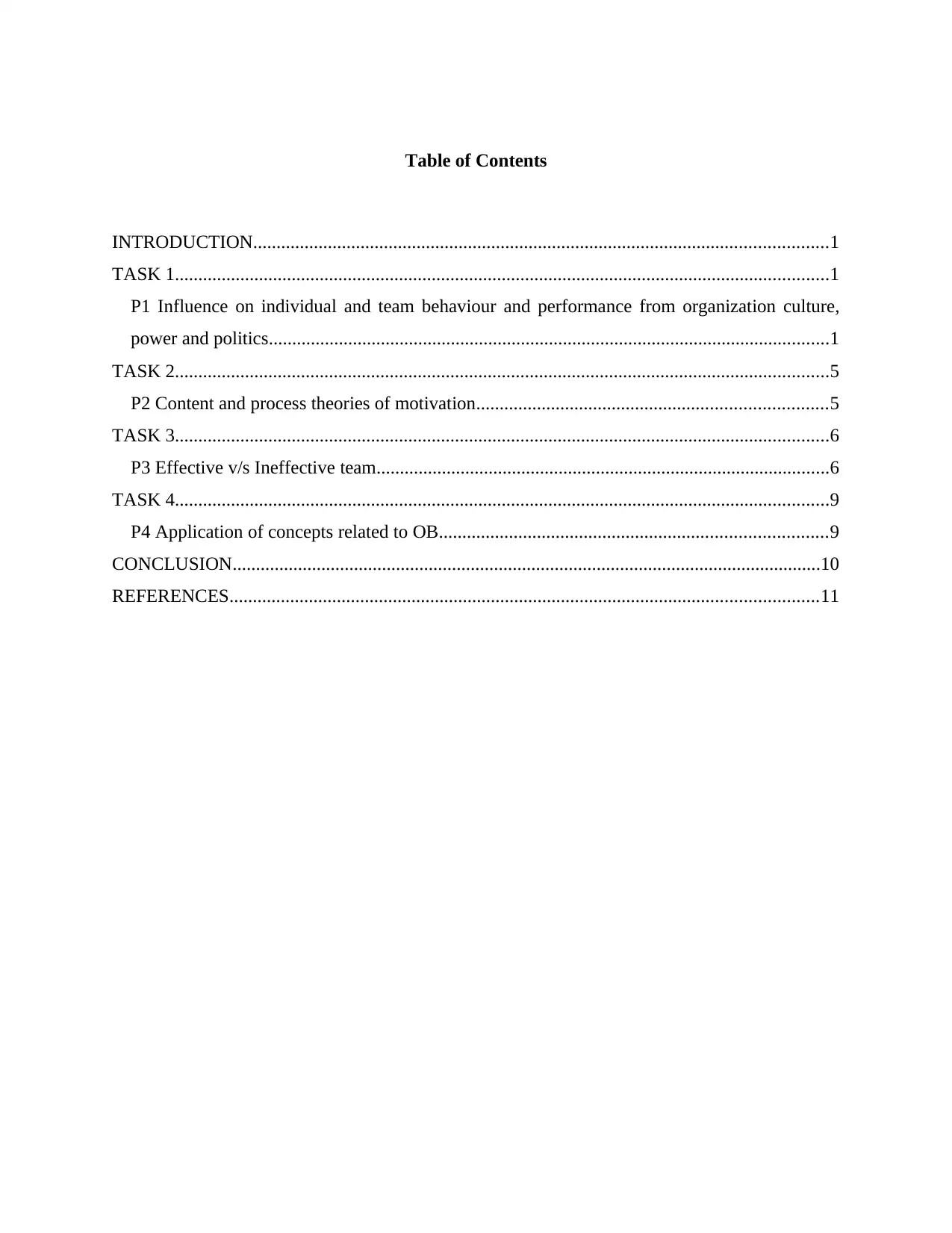
Table of Contents
INTRODUCTION...........................................................................................................................1
TASK 1............................................................................................................................................1
P1 Influence on individual and team behaviour and performance from organization culture,
power and politics........................................................................................................................1
TASK 2............................................................................................................................................5
P2 Content and process theories of motivation...........................................................................5
TASK 3............................................................................................................................................6
P3 Effective v/s Ineffective team.................................................................................................6
TASK 4............................................................................................................................................9
P4 Application of concepts related to OB...................................................................................9
CONCLUSION..............................................................................................................................10
REFERENCES..............................................................................................................................11
INTRODUCTION...........................................................................................................................1
TASK 1............................................................................................................................................1
P1 Influence on individual and team behaviour and performance from organization culture,
power and politics........................................................................................................................1
TASK 2............................................................................................................................................5
P2 Content and process theories of motivation...........................................................................5
TASK 3............................................................................................................................................6
P3 Effective v/s Ineffective team.................................................................................................6
TASK 4............................................................................................................................................9
P4 Application of concepts related to OB...................................................................................9
CONCLUSION..............................................................................................................................10
REFERENCES..............................................................................................................................11
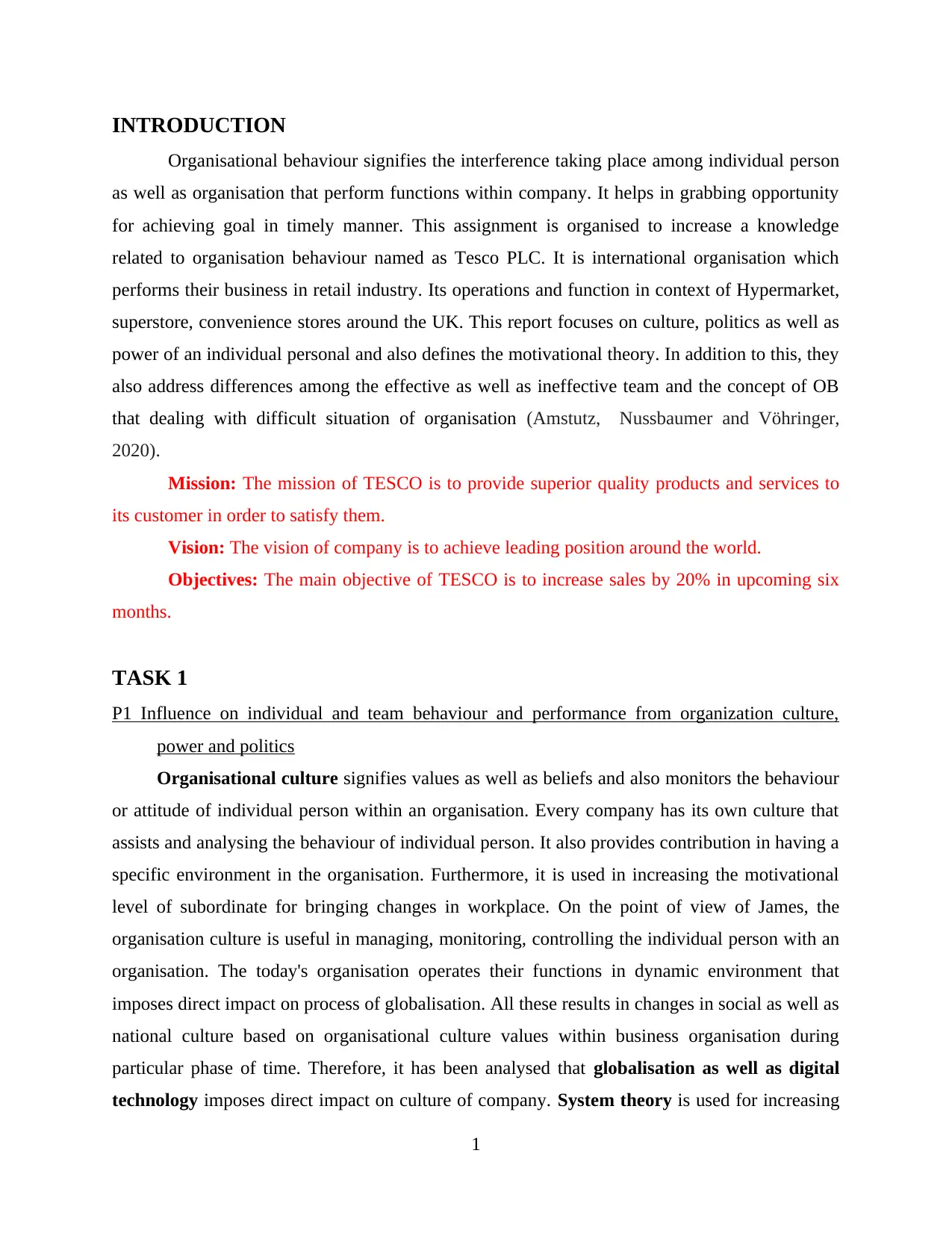
INTRODUCTION
Organisational behaviour signifies the interference taking place among individual person
as well as organisation that perform functions within company. It helps in grabbing opportunity
for achieving goal in timely manner. This assignment is organised to increase a knowledge
related to organisation behaviour named as Tesco PLC. It is international organisation which
performs their business in retail industry. Its operations and function in context of Hypermarket,
superstore, convenience stores around the UK. This report focuses on culture, politics as well as
power of an individual personal and also defines the motivational theory. In addition to this, they
also address differences among the effective as well as ineffective team and the concept of OB
that dealing with difficult situation of organisation (Amstutz, Nussbaumer and Vöhringer,
2020).
Mission: The mission of TESCO is to provide superior quality products and services to
its customer in order to satisfy them.
Vision: The vision of company is to achieve leading position around the world.
Objectives: The main objective of TESCO is to increase sales by 20% in upcoming six
months.
TASK 1
P1 Influence on individual and team behaviour and performance from organization culture,
power and politics
Organisational culture signifies values as well as beliefs and also monitors the behaviour
or attitude of individual person within an organisation. Every company has its own culture that
assists and analysing the behaviour of individual person. It also provides contribution in having a
specific environment in the organisation. Furthermore, it is used in increasing the motivational
level of subordinate for bringing changes in workplace. On the point of view of James, the
organisation culture is useful in managing, monitoring, controlling the individual person with an
organisation. The today's organisation operates their functions in dynamic environment that
imposes direct impact on process of globalisation. All these results in changes in social as well as
national culture based on organisational culture values within business organisation during
particular phase of time. Therefore, it has been analysed that globalisation as well as digital
technology imposes direct impact on culture of company. System theory is used for increasing
1
Organisational behaviour signifies the interference taking place among individual person
as well as organisation that perform functions within company. It helps in grabbing opportunity
for achieving goal in timely manner. This assignment is organised to increase a knowledge
related to organisation behaviour named as Tesco PLC. It is international organisation which
performs their business in retail industry. Its operations and function in context of Hypermarket,
superstore, convenience stores around the UK. This report focuses on culture, politics as well as
power of an individual personal and also defines the motivational theory. In addition to this, they
also address differences among the effective as well as ineffective team and the concept of OB
that dealing with difficult situation of organisation (Amstutz, Nussbaumer and Vöhringer,
2020).
Mission: The mission of TESCO is to provide superior quality products and services to
its customer in order to satisfy them.
Vision: The vision of company is to achieve leading position around the world.
Objectives: The main objective of TESCO is to increase sales by 20% in upcoming six
months.
TASK 1
P1 Influence on individual and team behaviour and performance from organization culture,
power and politics
Organisational culture signifies values as well as beliefs and also monitors the behaviour
or attitude of individual person within an organisation. Every company has its own culture that
assists and analysing the behaviour of individual person. It also provides contribution in having a
specific environment in the organisation. Furthermore, it is used in increasing the motivational
level of subordinate for bringing changes in workplace. On the point of view of James, the
organisation culture is useful in managing, monitoring, controlling the individual person with an
organisation. The today's organisation operates their functions in dynamic environment that
imposes direct impact on process of globalisation. All these results in changes in social as well as
national culture based on organisational culture values within business organisation during
particular phase of time. Therefore, it has been analysed that globalisation as well as digital
technology imposes direct impact on culture of company. System theory is used for increasing
1
⊘ This is a preview!⊘
Do you want full access?
Subscribe today to unlock all pages.

Trusted by 1+ million students worldwide
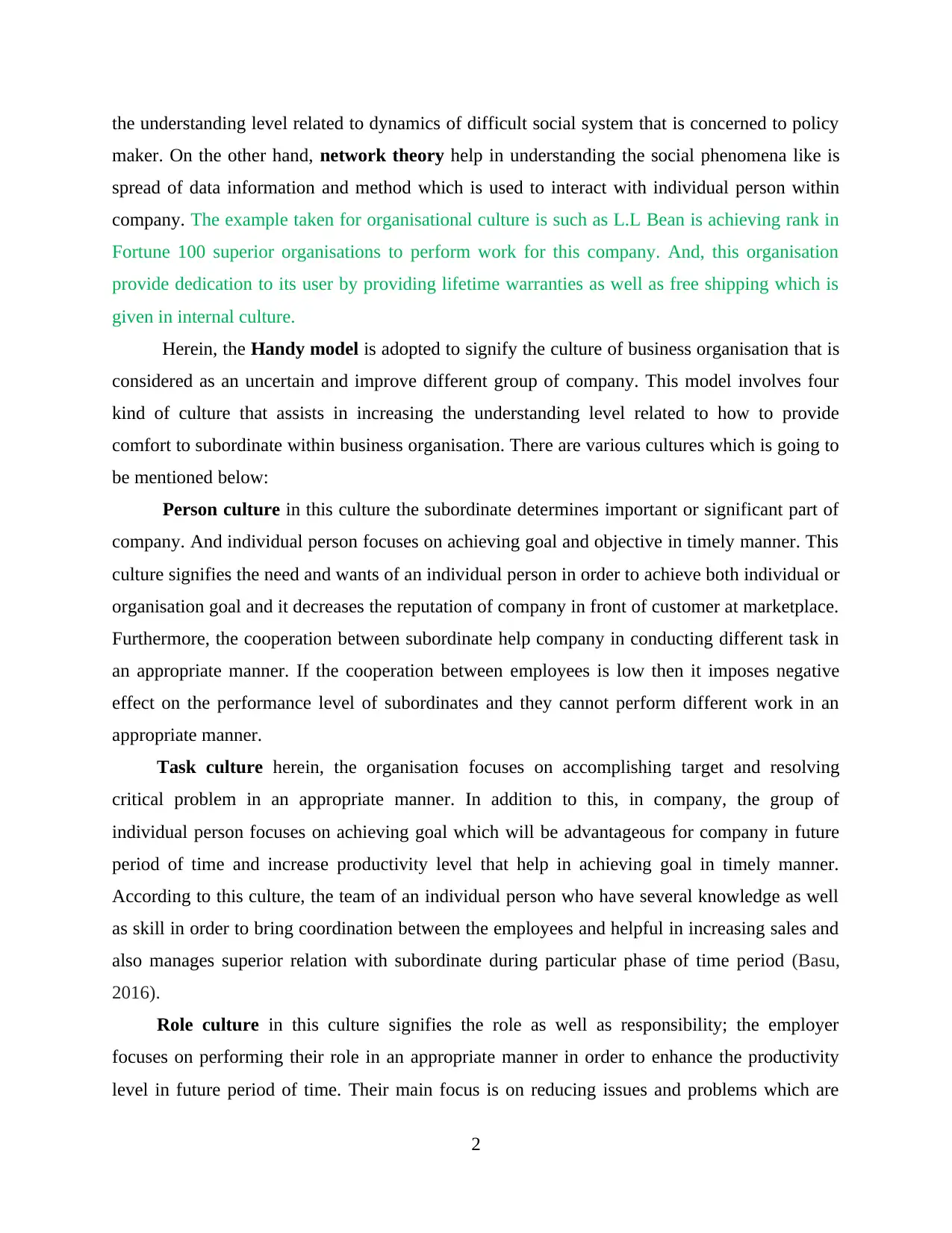
the understanding level related to dynamics of difficult social system that is concerned to policy
maker. On the other hand, network theory help in understanding the social phenomena like is
spread of data information and method which is used to interact with individual person within
company. The example taken for organisational culture is such as L.L Bean is achieving rank in
Fortune 100 superior organisations to perform work for this company. And, this organisation
provide dedication to its user by providing lifetime warranties as well as free shipping which is
given in internal culture.
Herein, the Handy model is adopted to signify the culture of business organisation that is
considered as an uncertain and improve different group of company. This model involves four
kind of culture that assists in increasing the understanding level related to how to provide
comfort to subordinate within business organisation. There are various cultures which is going to
be mentioned below:
Person culture in this culture the subordinate determines important or significant part of
company. And individual person focuses on achieving goal and objective in timely manner. This
culture signifies the need and wants of an individual person in order to achieve both individual or
organisation goal and it decreases the reputation of company in front of customer at marketplace.
Furthermore, the cooperation between subordinate help company in conducting different task in
an appropriate manner. If the cooperation between employees is low then it imposes negative
effect on the performance level of subordinates and they cannot perform different work in an
appropriate manner.
Task culture herein, the organisation focuses on accomplishing target and resolving
critical problem in an appropriate manner. In addition to this, in company, the group of
individual person focuses on achieving goal which will be advantageous for company in future
period of time and increase productivity level that help in achieving goal in timely manner.
According to this culture, the team of an individual person who have several knowledge as well
as skill in order to bring coordination between the employees and helpful in increasing sales and
also manages superior relation with subordinate during particular phase of time period (Basu,
2016).
Role culture in this culture signifies the role as well as responsibility; the employer
focuses on performing their role in an appropriate manner in order to enhance the productivity
level in future period of time. Their main focus is on reducing issues and problems which are
2
maker. On the other hand, network theory help in understanding the social phenomena like is
spread of data information and method which is used to interact with individual person within
company. The example taken for organisational culture is such as L.L Bean is achieving rank in
Fortune 100 superior organisations to perform work for this company. And, this organisation
provide dedication to its user by providing lifetime warranties as well as free shipping which is
given in internal culture.
Herein, the Handy model is adopted to signify the culture of business organisation that is
considered as an uncertain and improve different group of company. This model involves four
kind of culture that assists in increasing the understanding level related to how to provide
comfort to subordinate within business organisation. There are various cultures which is going to
be mentioned below:
Person culture in this culture the subordinate determines important or significant part of
company. And individual person focuses on achieving goal and objective in timely manner. This
culture signifies the need and wants of an individual person in order to achieve both individual or
organisation goal and it decreases the reputation of company in front of customer at marketplace.
Furthermore, the cooperation between subordinate help company in conducting different task in
an appropriate manner. If the cooperation between employees is low then it imposes negative
effect on the performance level of subordinates and they cannot perform different work in an
appropriate manner.
Task culture herein, the organisation focuses on accomplishing target and resolving
critical problem in an appropriate manner. In addition to this, in company, the group of
individual person focuses on achieving goal which will be advantageous for company in future
period of time and increase productivity level that help in achieving goal in timely manner.
According to this culture, the team of an individual person who have several knowledge as well
as skill in order to bring coordination between the employees and helpful in increasing sales and
also manages superior relation with subordinate during particular phase of time period (Basu,
2016).
Role culture in this culture signifies the role as well as responsibility; the employer
focuses on performing their role in an appropriate manner in order to enhance the productivity
level in future period of time. Their main focus is on reducing issues and problems which are
2
Paraphrase This Document
Need a fresh take? Get an instant paraphrase of this document with our AI Paraphraser
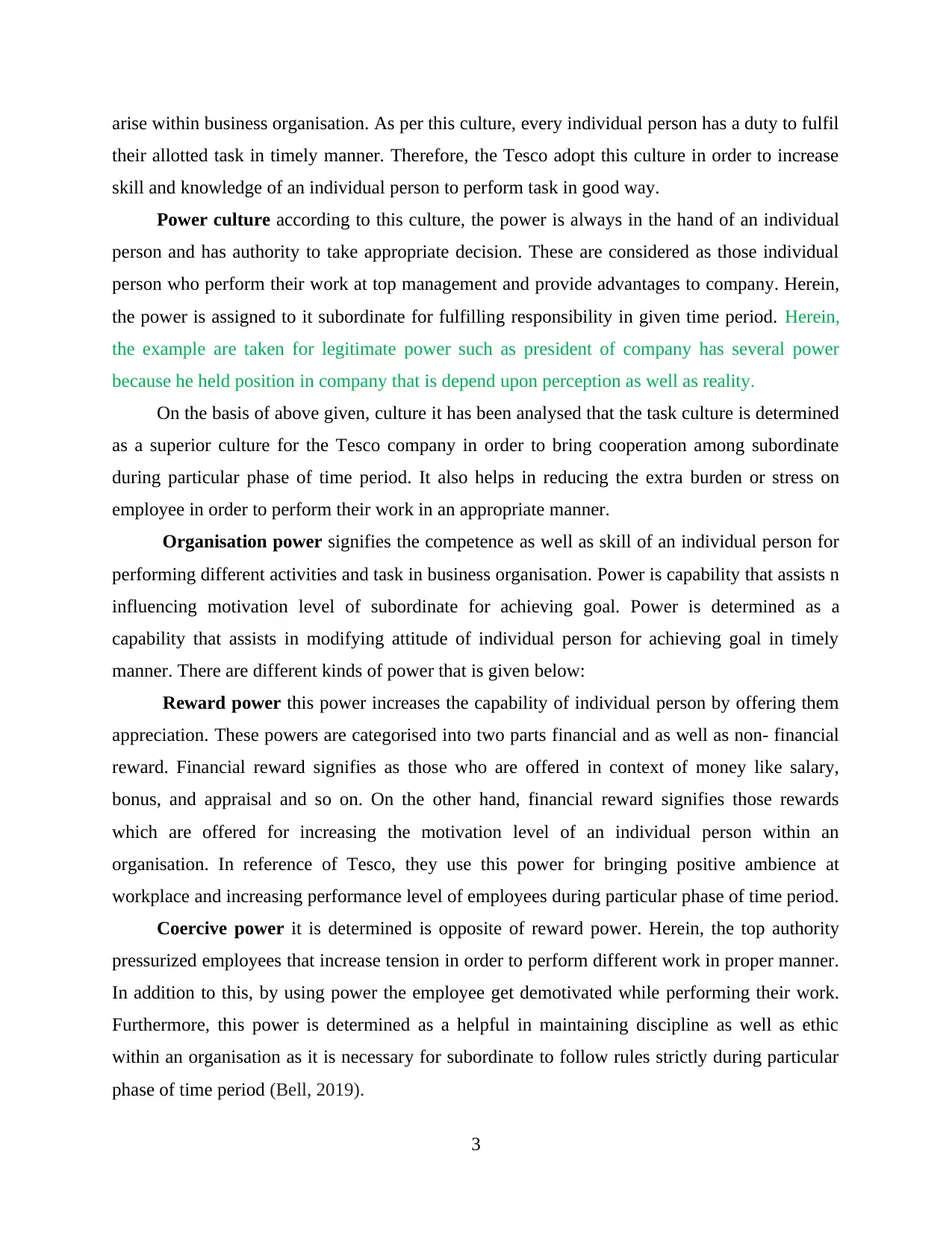
arise within business organisation. As per this culture, every individual person has a duty to fulfil
their allotted task in timely manner. Therefore, the Tesco adopt this culture in order to increase
skill and knowledge of an individual person to perform task in good way.
Power culture according to this culture, the power is always in the hand of an individual
person and has authority to take appropriate decision. These are considered as those individual
person who perform their work at top management and provide advantages to company. Herein,
the power is assigned to it subordinate for fulfilling responsibility in given time period. Herein,
the example are taken for legitimate power such as president of company has several power
because he held position in company that is depend upon perception as well as reality.
On the basis of above given, culture it has been analysed that the task culture is determined
as a superior culture for the Tesco company in order to bring cooperation among subordinate
during particular phase of time period. It also helps in reducing the extra burden or stress on
employee in order to perform their work in an appropriate manner.
Organisation power signifies the competence as well as skill of an individual person for
performing different activities and task in business organisation. Power is capability that assists n
influencing motivation level of subordinate for achieving goal. Power is determined as a
capability that assists in modifying attitude of individual person for achieving goal in timely
manner. There are different kinds of power that is given below:
Reward power this power increases the capability of individual person by offering them
appreciation. These powers are categorised into two parts financial and as well as non- financial
reward. Financial reward signifies as those who are offered in context of money like salary,
bonus, and appraisal and so on. On the other hand, financial reward signifies those rewards
which are offered for increasing the motivation level of an individual person within an
organisation. In reference of Tesco, they use this power for bringing positive ambience at
workplace and increasing performance level of employees during particular phase of time period.
Coercive power it is determined is opposite of reward power. Herein, the top authority
pressurized employees that increase tension in order to perform different work in proper manner.
In addition to this, by using power the employee get demotivated while performing their work.
Furthermore, this power is determined as a helpful in maintaining discipline as well as ethic
within an organisation as it is necessary for subordinate to follow rules strictly during particular
phase of time period (Bell, 2019).
3
their allotted task in timely manner. Therefore, the Tesco adopt this culture in order to increase
skill and knowledge of an individual person to perform task in good way.
Power culture according to this culture, the power is always in the hand of an individual
person and has authority to take appropriate decision. These are considered as those individual
person who perform their work at top management and provide advantages to company. Herein,
the power is assigned to it subordinate for fulfilling responsibility in given time period. Herein,
the example are taken for legitimate power such as president of company has several power
because he held position in company that is depend upon perception as well as reality.
On the basis of above given, culture it has been analysed that the task culture is determined
as a superior culture for the Tesco company in order to bring cooperation among subordinate
during particular phase of time period. It also helps in reducing the extra burden or stress on
employee in order to perform their work in an appropriate manner.
Organisation power signifies the competence as well as skill of an individual person for
performing different activities and task in business organisation. Power is capability that assists n
influencing motivation level of subordinate for achieving goal. Power is determined as a
capability that assists in modifying attitude of individual person for achieving goal in timely
manner. There are different kinds of power that is given below:
Reward power this power increases the capability of individual person by offering them
appreciation. These powers are categorised into two parts financial and as well as non- financial
reward. Financial reward signifies as those who are offered in context of money like salary,
bonus, and appraisal and so on. On the other hand, financial reward signifies those rewards
which are offered for increasing the motivation level of an individual person within an
organisation. In reference of Tesco, they use this power for bringing positive ambience at
workplace and increasing performance level of employees during particular phase of time period.
Coercive power it is determined is opposite of reward power. Herein, the top authority
pressurized employees that increase tension in order to perform different work in proper manner.
In addition to this, by using power the employee get demotivated while performing their work.
Furthermore, this power is determined as a helpful in maintaining discipline as well as ethic
within an organisation as it is necessary for subordinate to follow rules strictly during particular
phase of time period (Bell, 2019).
3
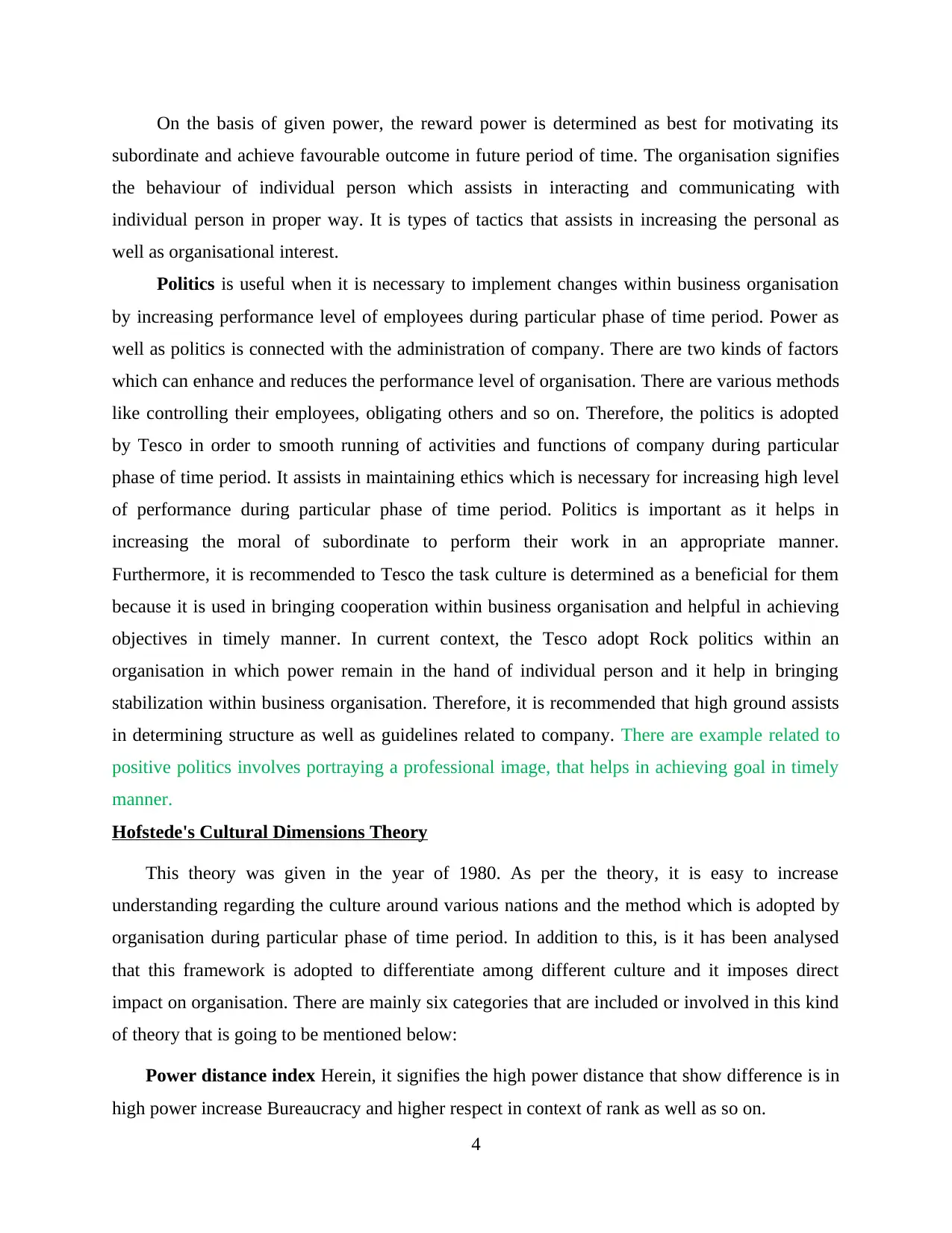
On the basis of given power, the reward power is determined as best for motivating its
subordinate and achieve favourable outcome in future period of time. The organisation signifies
the behaviour of individual person which assists in interacting and communicating with
individual person in proper way. It is types of tactics that assists in increasing the personal as
well as organisational interest.
Politics is useful when it is necessary to implement changes within business organisation
by increasing performance level of employees during particular phase of time period. Power as
well as politics is connected with the administration of company. There are two kinds of factors
which can enhance and reduces the performance level of organisation. There are various methods
like controlling their employees, obligating others and so on. Therefore, the politics is adopted
by Tesco in order to smooth running of activities and functions of company during particular
phase of time period. It assists in maintaining ethics which is necessary for increasing high level
of performance during particular phase of time period. Politics is important as it helps in
increasing the moral of subordinate to perform their work in an appropriate manner.
Furthermore, it is recommended to Tesco the task culture is determined as a beneficial for them
because it is used in bringing cooperation within business organisation and helpful in achieving
objectives in timely manner. In current context, the Tesco adopt Rock politics within an
organisation in which power remain in the hand of individual person and it help in bringing
stabilization within business organisation. Therefore, it is recommended that high ground assists
in determining structure as well as guidelines related to company. There are example related to
positive politics involves portraying a professional image, that helps in achieving goal in timely
manner.
Hofstede's Cultural Dimensions Theory
This theory was given in the year of 1980. As per the theory, it is easy to increase
understanding regarding the culture around various nations and the method which is adopted by
organisation during particular phase of time period. In addition to this, is it has been analysed
that this framework is adopted to differentiate among different culture and it imposes direct
impact on organisation. There are mainly six categories that are included or involved in this kind
of theory that is going to be mentioned below:
Power distance index Herein, it signifies the high power distance that show difference is in
high power increase Bureaucracy and higher respect in context of rank as well as so on.
4
subordinate and achieve favourable outcome in future period of time. The organisation signifies
the behaviour of individual person which assists in interacting and communicating with
individual person in proper way. It is types of tactics that assists in increasing the personal as
well as organisational interest.
Politics is useful when it is necessary to implement changes within business organisation
by increasing performance level of employees during particular phase of time period. Power as
well as politics is connected with the administration of company. There are two kinds of factors
which can enhance and reduces the performance level of organisation. There are various methods
like controlling their employees, obligating others and so on. Therefore, the politics is adopted
by Tesco in order to smooth running of activities and functions of company during particular
phase of time period. It assists in maintaining ethics which is necessary for increasing high level
of performance during particular phase of time period. Politics is important as it helps in
increasing the moral of subordinate to perform their work in an appropriate manner.
Furthermore, it is recommended to Tesco the task culture is determined as a beneficial for them
because it is used in bringing cooperation within business organisation and helpful in achieving
objectives in timely manner. In current context, the Tesco adopt Rock politics within an
organisation in which power remain in the hand of individual person and it help in bringing
stabilization within business organisation. Therefore, it is recommended that high ground assists
in determining structure as well as guidelines related to company. There are example related to
positive politics involves portraying a professional image, that helps in achieving goal in timely
manner.
Hofstede's Cultural Dimensions Theory
This theory was given in the year of 1980. As per the theory, it is easy to increase
understanding regarding the culture around various nations and the method which is adopted by
organisation during particular phase of time period. In addition to this, is it has been analysed
that this framework is adopted to differentiate among different culture and it imposes direct
impact on organisation. There are mainly six categories that are included or involved in this kind
of theory that is going to be mentioned below:
Power distance index Herein, it signifies the high power distance that show difference is in
high power increase Bureaucracy and higher respect in context of rank as well as so on.
4
⊘ This is a preview!⊘
Do you want full access?
Subscribe today to unlock all pages.

Trusted by 1+ million students worldwide
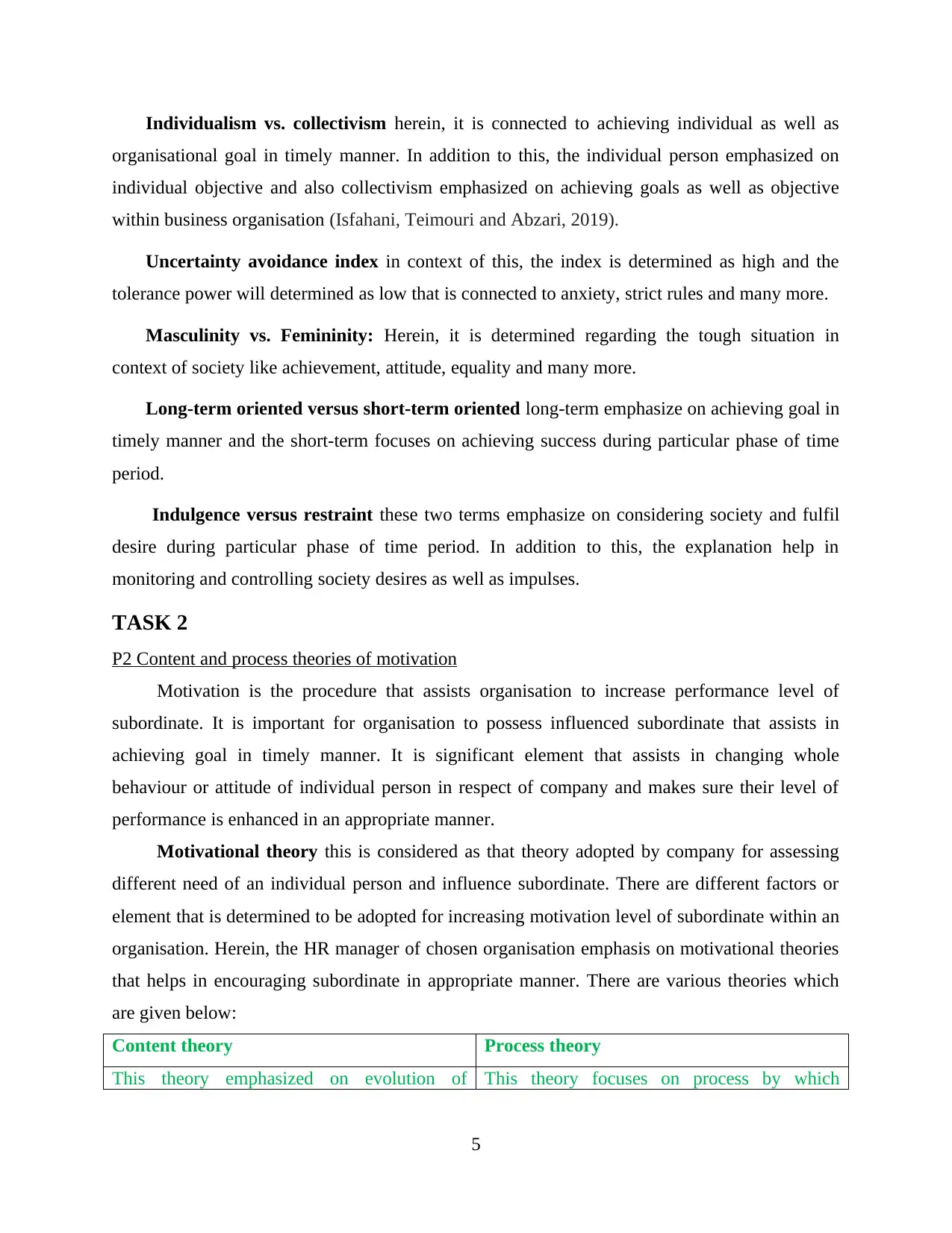
Individualism vs. collectivism herein, it is connected to achieving individual as well as
organisational goal in timely manner. In addition to this, the individual person emphasized on
individual objective and also collectivism emphasized on achieving goals as well as objective
within business organisation (Isfahani, Teimouri and Abzari, 2019).
Uncertainty avoidance index in context of this, the index is determined as high and the
tolerance power will determined as low that is connected to anxiety, strict rules and many more.
Masculinity vs. Femininity: Herein, it is determined regarding the tough situation in
context of society like achievement, attitude, equality and many more.
Long-term oriented versus short-term oriented long-term emphasize on achieving goal in
timely manner and the short-term focuses on achieving success during particular phase of time
period.
Indulgence versus restraint these two terms emphasize on considering society and fulfil
desire during particular phase of time period. In addition to this, the explanation help in
monitoring and controlling society desires as well as impulses.
TASK 2
P2 Content and process theories of motivation
Motivation is the procedure that assists organisation to increase performance level of
subordinate. It is important for organisation to possess influenced subordinate that assists in
achieving goal in timely manner. It is significant element that assists in changing whole
behaviour or attitude of individual person in respect of company and makes sure their level of
performance is enhanced in an appropriate manner.
Motivational theory this is considered as that theory adopted by company for assessing
different need of an individual person and influence subordinate. There are different factors or
element that is determined to be adopted for increasing motivation level of subordinate within an
organisation. Herein, the HR manager of chosen organisation emphasis on motivational theories
that helps in encouraging subordinate in appropriate manner. There are various theories which
are given below:
Content theory Process theory
This theory emphasized on evolution of This theory focuses on process by which
5
organisational goal in timely manner. In addition to this, the individual person emphasized on
individual objective and also collectivism emphasized on achieving goals as well as objective
within business organisation (Isfahani, Teimouri and Abzari, 2019).
Uncertainty avoidance index in context of this, the index is determined as high and the
tolerance power will determined as low that is connected to anxiety, strict rules and many more.
Masculinity vs. Femininity: Herein, it is determined regarding the tough situation in
context of society like achievement, attitude, equality and many more.
Long-term oriented versus short-term oriented long-term emphasize on achieving goal in
timely manner and the short-term focuses on achieving success during particular phase of time
period.
Indulgence versus restraint these two terms emphasize on considering society and fulfil
desire during particular phase of time period. In addition to this, the explanation help in
monitoring and controlling society desires as well as impulses.
TASK 2
P2 Content and process theories of motivation
Motivation is the procedure that assists organisation to increase performance level of
subordinate. It is important for organisation to possess influenced subordinate that assists in
achieving goal in timely manner. It is significant element that assists in changing whole
behaviour or attitude of individual person in respect of company and makes sure their level of
performance is enhanced in an appropriate manner.
Motivational theory this is considered as that theory adopted by company for assessing
different need of an individual person and influence subordinate. There are different factors or
element that is determined to be adopted for increasing motivation level of subordinate within an
organisation. Herein, the HR manager of chosen organisation emphasis on motivational theories
that helps in encouraging subordinate in appropriate manner. There are various theories which
are given below:
Content theory Process theory
This theory emphasized on evolution of This theory focuses on process by which
5
Paraphrase This Document
Need a fresh take? Get an instant paraphrase of this document with our AI Paraphraser
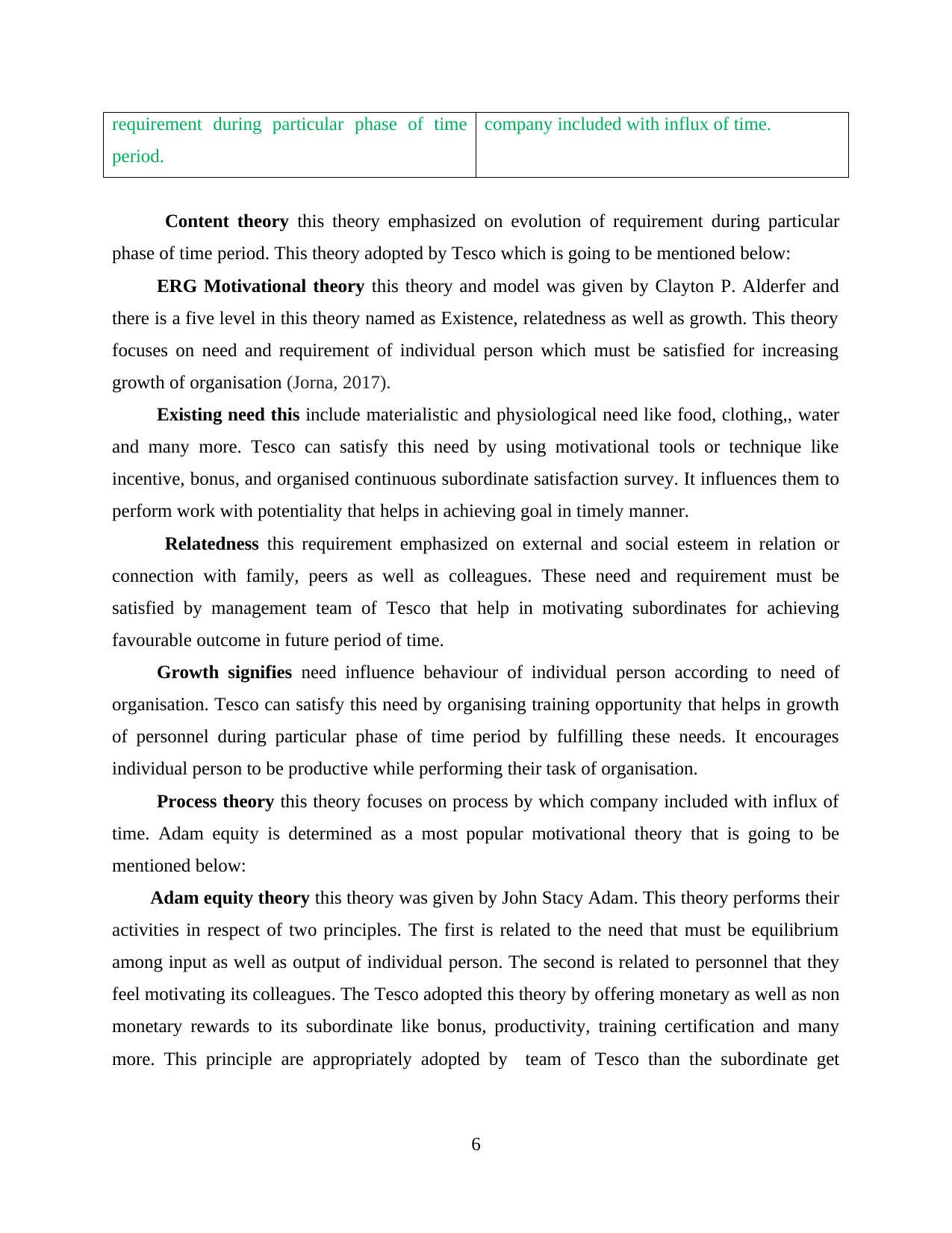
requirement during particular phase of time
period.
company included with influx of time.
Content theory this theory emphasized on evolution of requirement during particular
phase of time period. This theory adopted by Tesco which is going to be mentioned below:
ERG Motivational theory this theory and model was given by Clayton P. Alderfer and
there is a five level in this theory named as Existence, relatedness as well as growth. This theory
focuses on need and requirement of individual person which must be satisfied for increasing
growth of organisation (Jorna, 2017).
Existing need this include materialistic and physiological need like food, clothing,, water
and many more. Tesco can satisfy this need by using motivational tools or technique like
incentive, bonus, and organised continuous subordinate satisfaction survey. It influences them to
perform work with potentiality that helps in achieving goal in timely manner.
Relatedness this requirement emphasized on external and social esteem in relation or
connection with family, peers as well as colleagues. These need and requirement must be
satisfied by management team of Tesco that help in motivating subordinates for achieving
favourable outcome in future period of time.
Growth signifies need influence behaviour of individual person according to need of
organisation. Tesco can satisfy this need by organising training opportunity that helps in growth
of personnel during particular phase of time period by fulfilling these needs. It encourages
individual person to be productive while performing their task of organisation.
Process theory this theory focuses on process by which company included with influx of
time. Adam equity is determined as a most popular motivational theory that is going to be
mentioned below:
Adam equity theory this theory was given by John Stacy Adam. This theory performs their
activities in respect of two principles. The first is related to the need that must be equilibrium
among input as well as output of individual person. The second is related to personnel that they
feel motivating its colleagues. The Tesco adopted this theory by offering monetary as well as non
monetary rewards to its subordinate like bonus, productivity, training certification and many
more. This principle are appropriately adopted by team of Tesco than the subordinate get
6
period.
company included with influx of time.
Content theory this theory emphasized on evolution of requirement during particular
phase of time period. This theory adopted by Tesco which is going to be mentioned below:
ERG Motivational theory this theory and model was given by Clayton P. Alderfer and
there is a five level in this theory named as Existence, relatedness as well as growth. This theory
focuses on need and requirement of individual person which must be satisfied for increasing
growth of organisation (Jorna, 2017).
Existing need this include materialistic and physiological need like food, clothing,, water
and many more. Tesco can satisfy this need by using motivational tools or technique like
incentive, bonus, and organised continuous subordinate satisfaction survey. It influences them to
perform work with potentiality that helps in achieving goal in timely manner.
Relatedness this requirement emphasized on external and social esteem in relation or
connection with family, peers as well as colleagues. These need and requirement must be
satisfied by management team of Tesco that help in motivating subordinates for achieving
favourable outcome in future period of time.
Growth signifies need influence behaviour of individual person according to need of
organisation. Tesco can satisfy this need by organising training opportunity that helps in growth
of personnel during particular phase of time period by fulfilling these needs. It encourages
individual person to be productive while performing their task of organisation.
Process theory this theory focuses on process by which company included with influx of
time. Adam equity is determined as a most popular motivational theory that is going to be
mentioned below:
Adam equity theory this theory was given by John Stacy Adam. This theory performs their
activities in respect of two principles. The first is related to the need that must be equilibrium
among input as well as output of individual person. The second is related to personnel that they
feel motivating its colleagues. The Tesco adopted this theory by offering monetary as well as non
monetary rewards to its subordinate like bonus, productivity, training certification and many
more. This principle are appropriately adopted by team of Tesco than the subordinate get
6
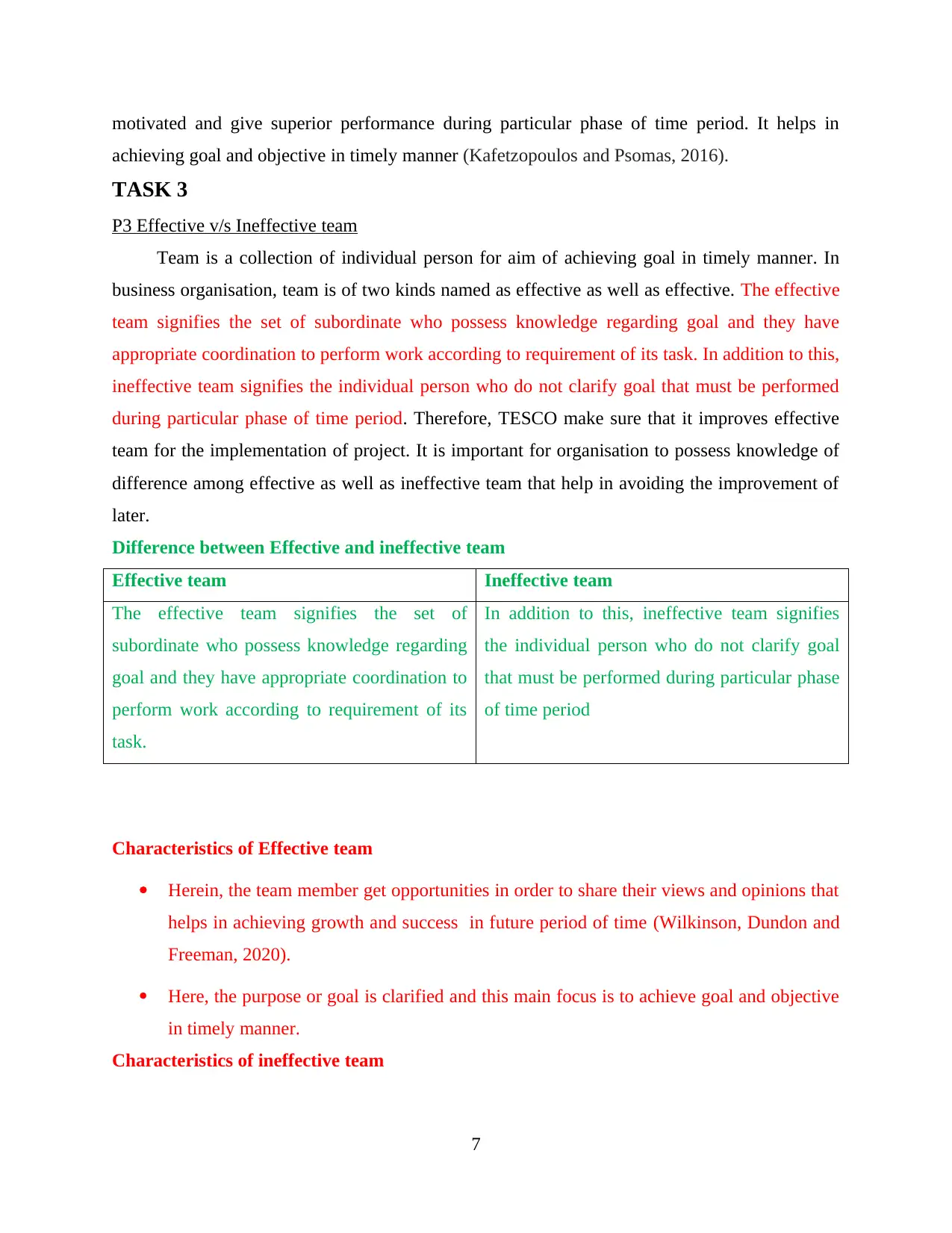
motivated and give superior performance during particular phase of time period. It helps in
achieving goal and objective in timely manner (Kafetzopoulos and Psomas, 2016).
TASK 3
P3 Effective v/s Ineffective team
Team is a collection of individual person for aim of achieving goal in timely manner. In
business organisation, team is of two kinds named as effective as well as effective. The effective
team signifies the set of subordinate who possess knowledge regarding goal and they have
appropriate coordination to perform work according to requirement of its task. In addition to this,
ineffective team signifies the individual person who do not clarify goal that must be performed
during particular phase of time period. Therefore, TESCO make sure that it improves effective
team for the implementation of project. It is important for organisation to possess knowledge of
difference among effective as well as ineffective team that help in avoiding the improvement of
later.
Difference between Effective and ineffective team
Effective team Ineffective team
The effective team signifies the set of
subordinate who possess knowledge regarding
goal and they have appropriate coordination to
perform work according to requirement of its
task.
In addition to this, ineffective team signifies
the individual person who do not clarify goal
that must be performed during particular phase
of time period
Characteristics of Effective team
Herein, the team member get opportunities in order to share their views and opinions that
helps in achieving growth and success in future period of time (Wilkinson, Dundon and
Freeman, 2020).
Here, the purpose or goal is clarified and this main focus is to achieve goal and objective
in timely manner.
Characteristics of ineffective team
7
achieving goal and objective in timely manner (Kafetzopoulos and Psomas, 2016).
TASK 3
P3 Effective v/s Ineffective team
Team is a collection of individual person for aim of achieving goal in timely manner. In
business organisation, team is of two kinds named as effective as well as effective. The effective
team signifies the set of subordinate who possess knowledge regarding goal and they have
appropriate coordination to perform work according to requirement of its task. In addition to this,
ineffective team signifies the individual person who do not clarify goal that must be performed
during particular phase of time period. Therefore, TESCO make sure that it improves effective
team for the implementation of project. It is important for organisation to possess knowledge of
difference among effective as well as ineffective team that help in avoiding the improvement of
later.
Difference between Effective and ineffective team
Effective team Ineffective team
The effective team signifies the set of
subordinate who possess knowledge regarding
goal and they have appropriate coordination to
perform work according to requirement of its
task.
In addition to this, ineffective team signifies
the individual person who do not clarify goal
that must be performed during particular phase
of time period
Characteristics of Effective team
Herein, the team member get opportunities in order to share their views and opinions that
helps in achieving growth and success in future period of time (Wilkinson, Dundon and
Freeman, 2020).
Here, the purpose or goal is clarified and this main focus is to achieve goal and objective
in timely manner.
Characteristics of ineffective team
7
⊘ This is a preview!⊘
Do you want full access?
Subscribe today to unlock all pages.

Trusted by 1+ million students worldwide
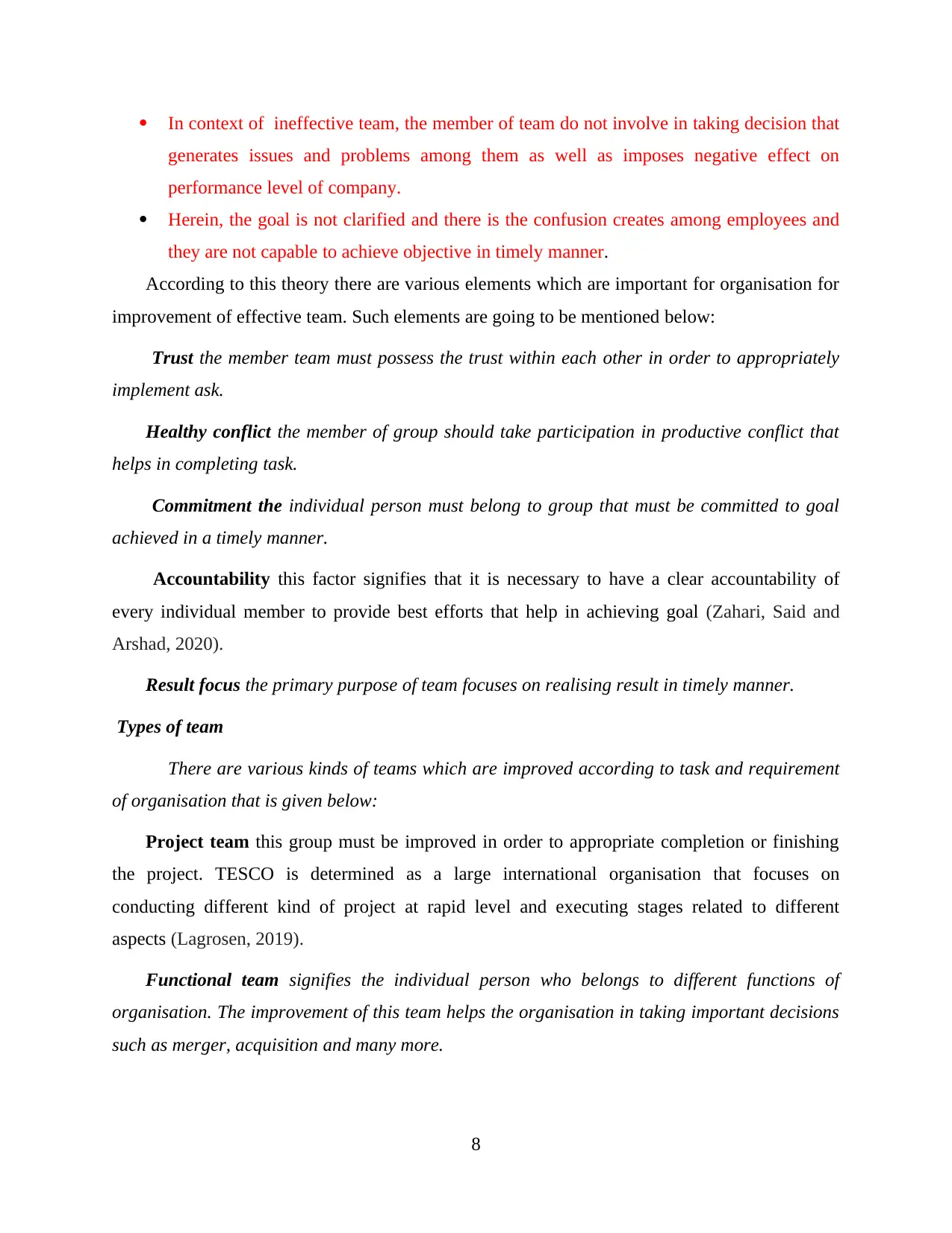
In context of ineffective team, the member of team do not involve in taking decision that
generates issues and problems among them as well as imposes negative effect on
performance level of company.
Herein, the goal is not clarified and there is the confusion creates among employees and
they are not capable to achieve objective in timely manner.
According to this theory there are various elements which are important for organisation for
improvement of effective team. Such elements are going to be mentioned below:
Trust the member team must possess the trust within each other in order to appropriately
implement ask.
Healthy conflict the member of group should take participation in productive conflict that
helps in completing task.
Commitment the individual person must belong to group that must be committed to goal
achieved in a timely manner.
Accountability this factor signifies that it is necessary to have a clear accountability of
every individual member to provide best efforts that help in achieving goal (Zahari, Said and
Arshad, 2020).
Result focus the primary purpose of team focuses on realising result in timely manner.
Types of team
There are various kinds of teams which are improved according to task and requirement
of organisation that is given below:
Project team this group must be improved in order to appropriate completion or finishing
the project. TESCO is determined as a large international organisation that focuses on
conducting different kind of project at rapid level and executing stages related to different
aspects (Lagrosen, 2019).
Functional team signifies the individual person who belongs to different functions of
organisation. The improvement of this team helps the organisation in taking important decisions
such as merger, acquisition and many more.
8
generates issues and problems among them as well as imposes negative effect on
performance level of company.
Herein, the goal is not clarified and there is the confusion creates among employees and
they are not capable to achieve objective in timely manner.
According to this theory there are various elements which are important for organisation for
improvement of effective team. Such elements are going to be mentioned below:
Trust the member team must possess the trust within each other in order to appropriately
implement ask.
Healthy conflict the member of group should take participation in productive conflict that
helps in completing task.
Commitment the individual person must belong to group that must be committed to goal
achieved in a timely manner.
Accountability this factor signifies that it is necessary to have a clear accountability of
every individual member to provide best efforts that help in achieving goal (Zahari, Said and
Arshad, 2020).
Result focus the primary purpose of team focuses on realising result in timely manner.
Types of team
There are various kinds of teams which are improved according to task and requirement
of organisation that is given below:
Project team this group must be improved in order to appropriate completion or finishing
the project. TESCO is determined as a large international organisation that focuses on
conducting different kind of project at rapid level and executing stages related to different
aspects (Lagrosen, 2019).
Functional team signifies the individual person who belongs to different functions of
organisation. The improvement of this team helps the organisation in taking important decisions
such as merger, acquisition and many more.
8
Paraphrase This Document
Need a fresh take? Get an instant paraphrase of this document with our AI Paraphraser
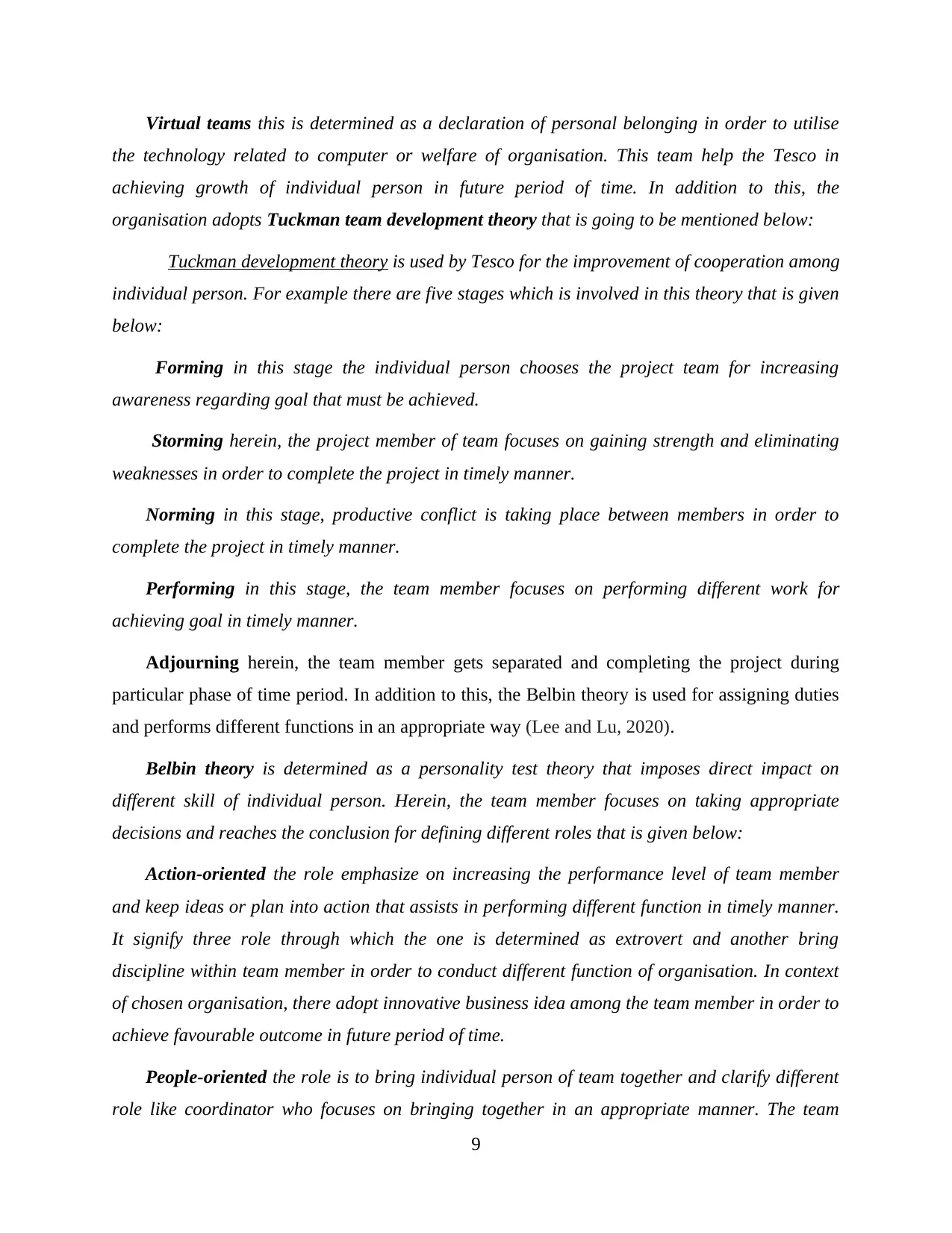
Virtual teams this is determined as a declaration of personal belonging in order to utilise
the technology related to computer or welfare of organisation. This team help the Tesco in
achieving growth of individual person in future period of time. In addition to this, the
organisation adopts Tuckman team development theory that is going to be mentioned below:
Tuckman development theory is used by Tesco for the improvement of cooperation among
individual person. For example there are five stages which is involved in this theory that is given
below:
Forming in this stage the individual person chooses the project team for increasing
awareness regarding goal that must be achieved.
Storming herein, the project member of team focuses on gaining strength and eliminating
weaknesses in order to complete the project in timely manner.
Norming in this stage, productive conflict is taking place between members in order to
complete the project in timely manner.
Performing in this stage, the team member focuses on performing different work for
achieving goal in timely manner.
Adjourning herein, the team member gets separated and completing the project during
particular phase of time period. In addition to this, the Belbin theory is used for assigning duties
and performs different functions in an appropriate way (Lee and Lu, 2020).
Belbin theory is determined as a personality test theory that imposes direct impact on
different skill of individual person. Herein, the team member focuses on taking appropriate
decisions and reaches the conclusion for defining different roles that is given below:
Action-oriented the role emphasize on increasing the performance level of team member
and keep ideas or plan into action that assists in performing different function in timely manner.
It signify three role through which the one is determined as extrovert and another bring
discipline within team member in order to conduct different function of organisation. In context
of chosen organisation, there adopt innovative business idea among the team member in order to
achieve favourable outcome in future period of time.
People-oriented the role is to bring individual person of team together and clarify different
role like coordinator who focuses on bringing together in an appropriate manner. The team
9
the technology related to computer or welfare of organisation. This team help the Tesco in
achieving growth of individual person in future period of time. In addition to this, the
organisation adopts Tuckman team development theory that is going to be mentioned below:
Tuckman development theory is used by Tesco for the improvement of cooperation among
individual person. For example there are five stages which is involved in this theory that is given
below:
Forming in this stage the individual person chooses the project team for increasing
awareness regarding goal that must be achieved.
Storming herein, the project member of team focuses on gaining strength and eliminating
weaknesses in order to complete the project in timely manner.
Norming in this stage, productive conflict is taking place between members in order to
complete the project in timely manner.
Performing in this stage, the team member focuses on performing different work for
achieving goal in timely manner.
Adjourning herein, the team member gets separated and completing the project during
particular phase of time period. In addition to this, the Belbin theory is used for assigning duties
and performs different functions in an appropriate way (Lee and Lu, 2020).
Belbin theory is determined as a personality test theory that imposes direct impact on
different skill of individual person. Herein, the team member focuses on taking appropriate
decisions and reaches the conclusion for defining different roles that is given below:
Action-oriented the role emphasize on increasing the performance level of team member
and keep ideas or plan into action that assists in performing different function in timely manner.
It signify three role through which the one is determined as extrovert and another bring
discipline within team member in order to conduct different function of organisation. In context
of chosen organisation, there adopt innovative business idea among the team member in order to
achieve favourable outcome in future period of time.
People-oriented the role is to bring individual person of team together and clarify different
role like coordinator who focuses on bringing together in an appropriate manner. The team
9
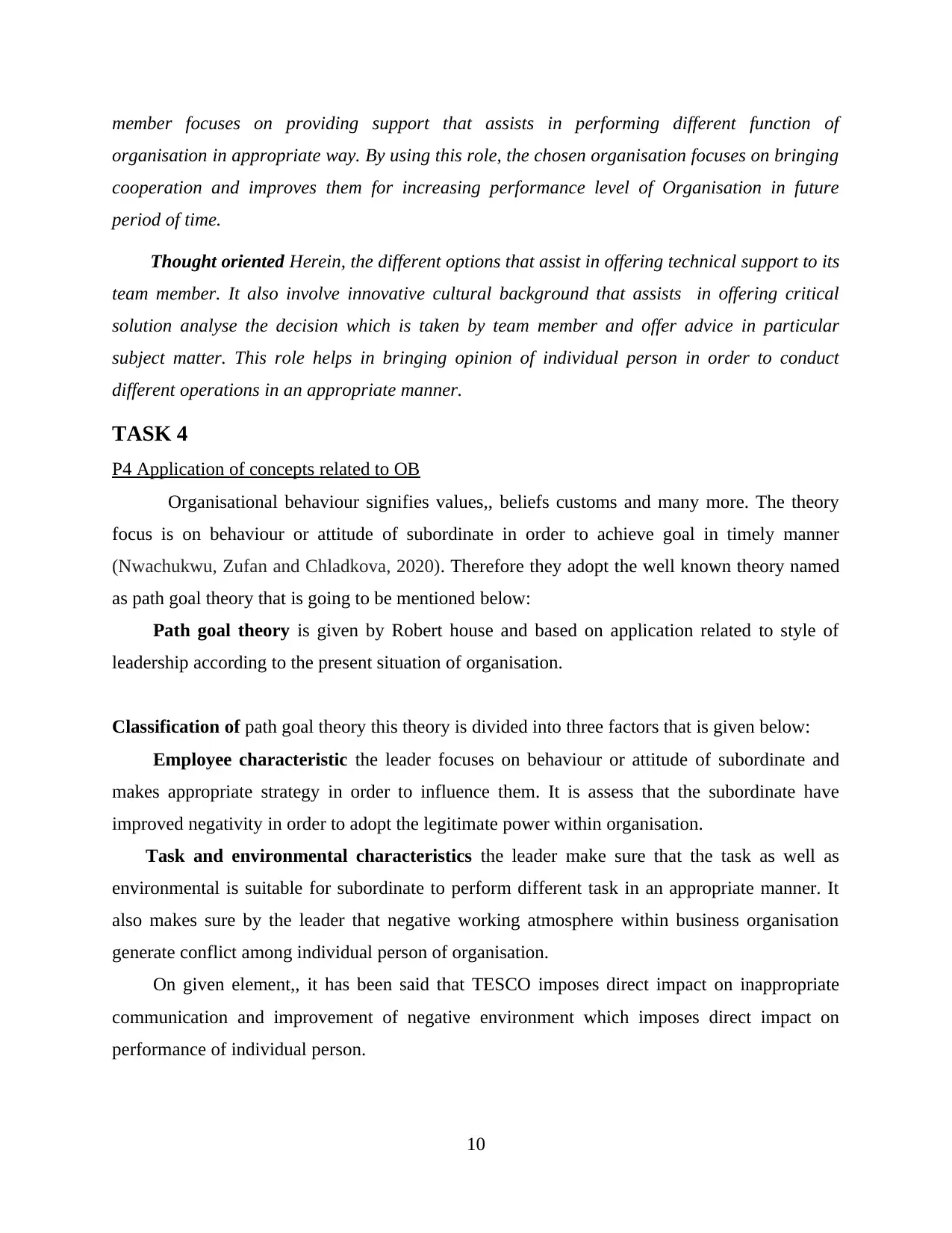
member focuses on providing support that assists in performing different function of
organisation in appropriate way. By using this role, the chosen organisation focuses on bringing
cooperation and improves them for increasing performance level of Organisation in future
period of time.
Thought oriented Herein, the different options that assist in offering technical support to its
team member. It also involve innovative cultural background that assists in offering critical
solution analyse the decision which is taken by team member and offer advice in particular
subject matter. This role helps in bringing opinion of individual person in order to conduct
different operations in an appropriate manner.
TASK 4
P4 Application of concepts related to OB
Organisational behaviour signifies values,, beliefs customs and many more. The theory
focus is on behaviour or attitude of subordinate in order to achieve goal in timely manner
(Nwachukwu, Zufan and Chladkova, 2020). Therefore they adopt the well known theory named
as path goal theory that is going to be mentioned below:
Path goal theory is given by Robert house and based on application related to style of
leadership according to the present situation of organisation.
Classification of path goal theory this theory is divided into three factors that is given below:
Employee characteristic the leader focuses on behaviour or attitude of subordinate and
makes appropriate strategy in order to influence them. It is assess that the subordinate have
improved negativity in order to adopt the legitimate power within organisation.
Task and environmental characteristics the leader make sure that the task as well as
environmental is suitable for subordinate to perform different task in an appropriate manner. It
also makes sure by the leader that negative working atmosphere within business organisation
generate conflict among individual person of organisation.
On given element,, it has been said that TESCO imposes direct impact on inappropriate
communication and improvement of negative environment which imposes direct impact on
performance of individual person.
10
organisation in appropriate way. By using this role, the chosen organisation focuses on bringing
cooperation and improves them for increasing performance level of Organisation in future
period of time.
Thought oriented Herein, the different options that assist in offering technical support to its
team member. It also involve innovative cultural background that assists in offering critical
solution analyse the decision which is taken by team member and offer advice in particular
subject matter. This role helps in bringing opinion of individual person in order to conduct
different operations in an appropriate manner.
TASK 4
P4 Application of concepts related to OB
Organisational behaviour signifies values,, beliefs customs and many more. The theory
focus is on behaviour or attitude of subordinate in order to achieve goal in timely manner
(Nwachukwu, Zufan and Chladkova, 2020). Therefore they adopt the well known theory named
as path goal theory that is going to be mentioned below:
Path goal theory is given by Robert house and based on application related to style of
leadership according to the present situation of organisation.
Classification of path goal theory this theory is divided into three factors that is given below:
Employee characteristic the leader focuses on behaviour or attitude of subordinate and
makes appropriate strategy in order to influence them. It is assess that the subordinate have
improved negativity in order to adopt the legitimate power within organisation.
Task and environmental characteristics the leader make sure that the task as well as
environmental is suitable for subordinate to perform different task in an appropriate manner. It
also makes sure by the leader that negative working atmosphere within business organisation
generate conflict among individual person of organisation.
On given element,, it has been said that TESCO imposes direct impact on inappropriate
communication and improvement of negative environment which imposes direct impact on
performance of individual person.
10
⊘ This is a preview!⊘
Do you want full access?
Subscribe today to unlock all pages.

Trusted by 1+ million students worldwide
1 out of 14
Related Documents
Your All-in-One AI-Powered Toolkit for Academic Success.
+13062052269
info@desklib.com
Available 24*7 on WhatsApp / Email
![[object Object]](/_next/static/media/star-bottom.7253800d.svg)
Unlock your academic potential
Copyright © 2020–2026 A2Z Services. All Rights Reserved. Developed and managed by ZUCOL.





